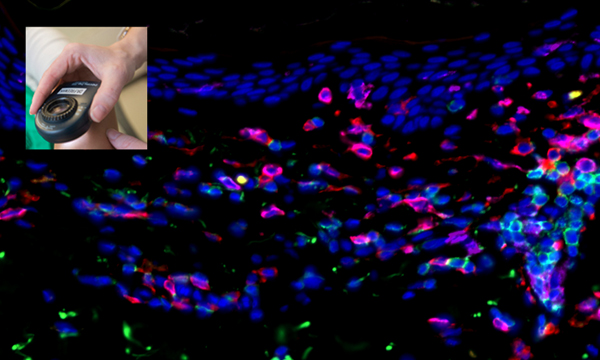High Risk Skin Cancer Clinic


Contact Information
High Risk Skin Cancer Clinic
Massachusetts General Hospital
Department of Dermatology
50 Staniford Street
Boston,
MA
02114
Phone: 617-726-6097
Fax: 617-726-7768
Referrals
For referrals from doctors within Mass General Brigham, please refer using EPIC Clinicals, and search for MGH High Risk.
For referrals from doctors outside of Mass General Brigham, please call 617-726-6097 or fax us at 617-726-7768
Explore This Clinic
Overview
The High Risk Skin Cancer Clinic (HRSCC) at Massachusetts General Hospital is a program designed to provide comprehensive care for those at elevated risk for non-melanoma skin cancer (e.g. squamous cell carcinoma and basal cell carcinoma). The majority of patients are solid organ transplant recipients, those with certain types of leukemia, and patients with genetic syndromes that predispose them to skin cancer.
The HRSCC was established in 2012 and combines the expertise of medical and surgical dermatologists as well as collaboration with Mass General's Transplant Center, Cancer Center, and departments of Otolaryngology (ENT) and Plastic and Reconstructive Surgery.
Our highly experienced dermatologists create a personalized skin cancer prevention and treatment plan that fits your individual needs. We monitor you closely and aim to treat any non-melanoma skin cancers early; before it is able to cause serious problems.
Who We Serve
The HRSCC specialty clinic is specifically designed for patients who:
- Are a candidate for an organ or bone marrow transplant, or have received a transplant
- Have chronic lymphocytic leukemia (CLL) or Lymphoma
- Have been diagnosed with four or more skin cancers within the past 12 months
- Have a genetic disorder with a tendency to increase the risk of skin cancer
- Are on long-term medications that suppress the immune system
Please note: If you do not fit the patient eligibility criteria, please contact our medical dermatology department at 617-726-2914.
About This Program
What We Do
We offer advanced treatment for basal cell and squamous cell skin cancers. These cancers are non-melanoma, yet if not diagnosed and treated early, they can spread to other areas of the body. Basal cell skin cancer often looks like open sores, red, or pink patches, or bumps. Squamous cell skin cancer can appear as rough, pink, scaly patches that can bleed.
What We Offer
We offer expert diagnosis along with advanced treatments. The latest available treatments, such as chemo wraps and photodynamic therapy, are part of our everyday treatment plans. If needed, we have Boston's most experienced Mohs surgeons as part of our clinic staff.
Our preventative services and advanced treatment plans include chemo wraps. Chemo wraps help reduce the need for surgery, we apply topical medicine and wrap the skin lesion for one week. Not all clinics offer this treatment.
What to Expect
During an initial consultation, the patient's skin is examined by one of the clinic's co-directors and suspected skin cancers are addressed. Based on the patient's current skin cancer burden, history of previous skin cancers, and pre-cancers, degree of immune system compromise, and history of sun exposure, an action plan is put into place to address the following:
- Treatment of current skin cancers using methods such as Mohs surgery, surgical excision, electrodessication and curettage, or in certain situations light-based therapy or topical agents.
- Strategies to prevent future skin cancers through vigilant sun protection and in appropriate cases with the use of oral, topical, and/or light-based therapies.
- A follow-up plan for return to the HRSCC for regular skin examinations.
Dermatologists at the HRSCC work closely with referring services such as the Mass General Transplant Center to tailor a patient's skin cancer action plan to fit their unique medical situation. In the case of solid organ transplant patients, there is often a close collaboration with the transplant team to modify the use of immunosuppressive agents and to utilize oral and/or topical treatments that may be helpful in decreasing the number of new skin cancers.
In rare instances where non-melanoma skin cancer (e.g. squamous cell and basal cell carcinoma) is more advanced and has spread to lymph nodes or to distant organs, the directors of the HRSCC participate in a multi-disciplinary tumor board comprised of representatives from the departments of Otolaryngology (ENT), medical oncology, and radiation oncology who work together to plan the most appropriate interventions to maximize the chance of cure and quality of life.
Our Team
-
![]()
- Associate Professor of Dermatology, Harvard Medical School
- Director, High Risk Skin Cancer Clinic
-
![]()
- Dermatology, Vice Chief, Diversity Equity and Inclusion
Patient Gateway
Secure online access to your health information whenever you need it. Check appointments, communicate with your provider and pay bills online 24/7.
High Risk Skin Cancer Clinic
Specialty care for patients who are at higher risk for developing skin cancer due to an organ transplant, a suppressed immune system, or a genetic disorder.


